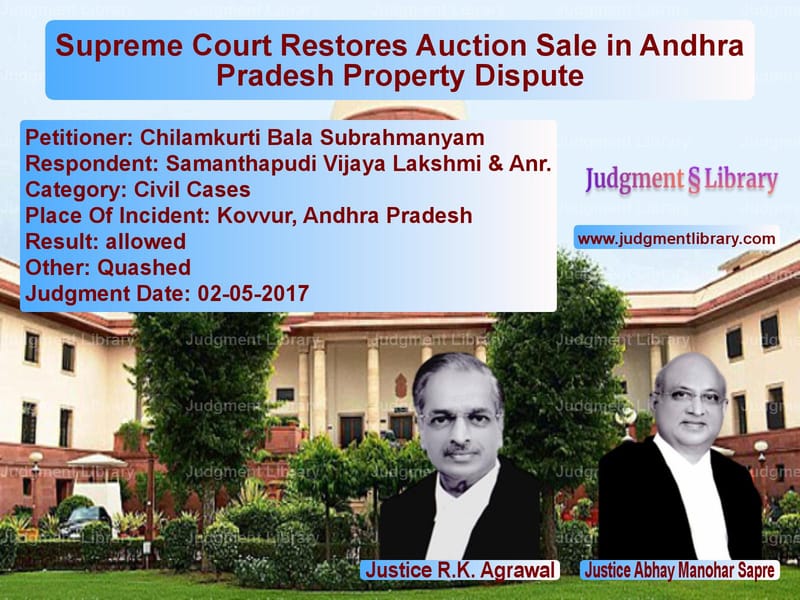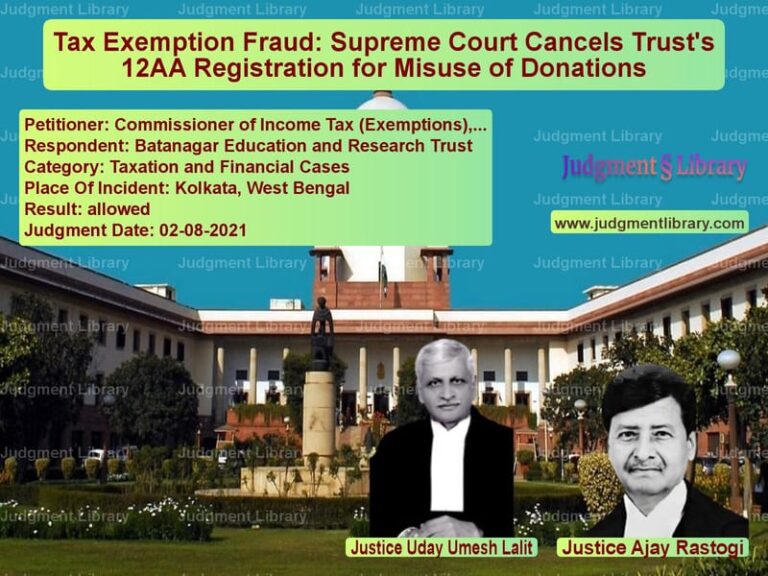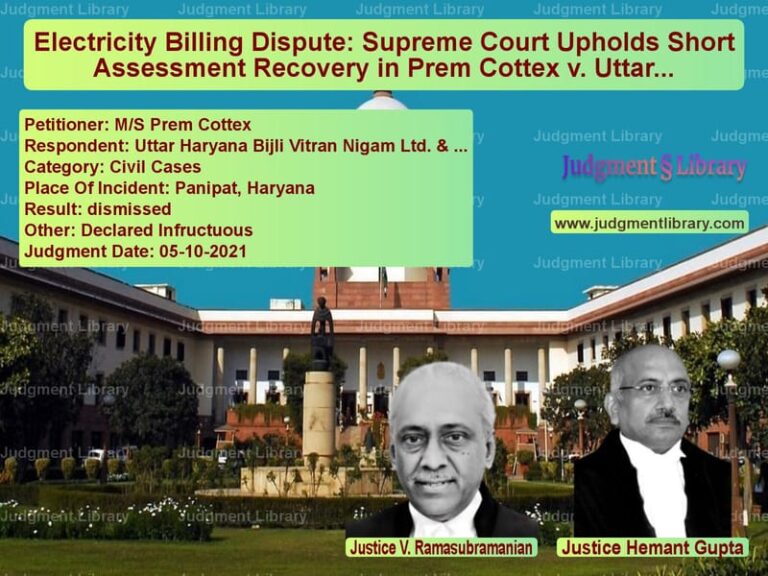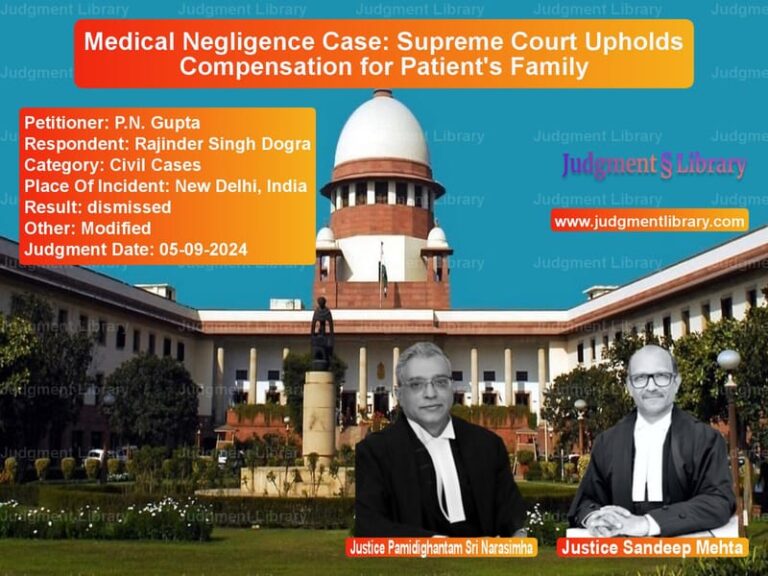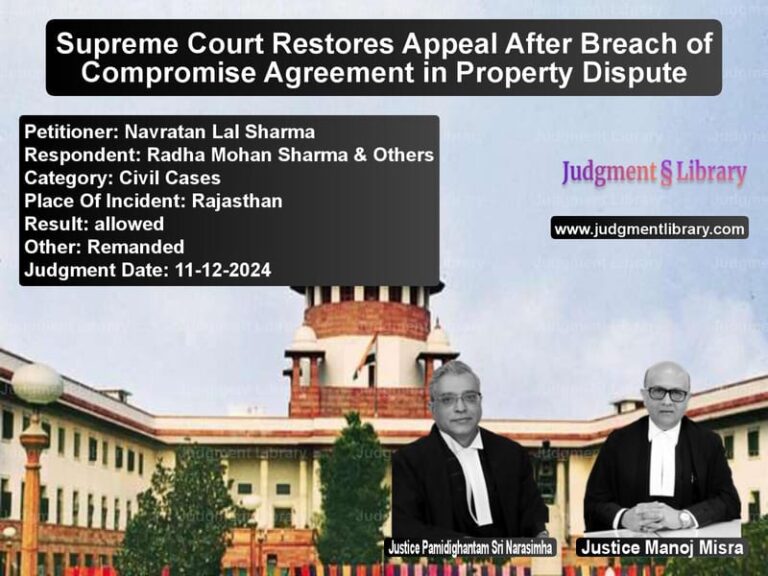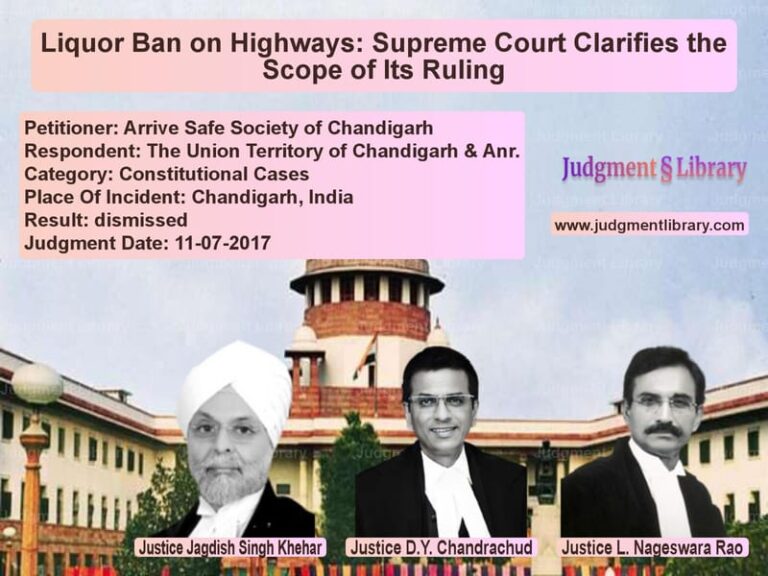Supreme Court Restores Auction Sale in Andhra Pradesh Property Dispute
The Supreme Court of India, in its judgment dated May 2, 2017, in the case of Chilamkurti Bala Subrahmanyam vs. Samanthapudi Vijaya Lakshmi & Anr., upheld the auction sale of a property in Andhra Pradesh that had been challenged by the judgment debtor. The Court ruled that there was no material irregularity or fraud in conducting the auction and reversed the High Court’s decision, which had set aside the sale. This ruling underscores the principle that mere allegations of irregularity are insufficient to invalidate an auction unless substantial injury is proven.
Background of the Case
The dispute arose from the execution of a money decree in favor of State Bank of India (SBI), the decree holder, against the judgment debtor, Samanthapudi Vijaya Lakshmi. SBI had obtained a decree for Rs.5,15,390/- on March 16, 1998, in connection with an unpaid loan. Since the judgment debtor failed to satisfy the decree, SBI initiated execution proceedings, leading to the auction sale of the attached property.
The sale was conducted on November 17, 1999, where the appellant, Chilamkurti Bala Subrahmanyam, emerged as the highest bidder with a bid of Rs.7,15,000/-. However, the judgment debtor challenged the sale under Order 21 Rule 90 of the Civil Procedure Code (CPC), alleging procedural irregularities. The executing court dismissed the objections, but the High Court set aside the auction sale, leading to an appeal before the Supreme Court.
Legal Issues Examined
The Supreme Court analyzed the following key legal questions:
- Whether the auction sale was conducted in accordance with the prescribed procedure under Order 21 Rules 64 and 90 of the CPC.
- Whether the judgment debtor had established material irregularity or fraud in conducting the auction.
- Whether the High Court had erred in interfering with the executing court’s findings.
- Whether the appellant, as the auction purchaser, had acquired valid title over the property.
Arguments by the Appellant (Auction Purchaser)
- The appellant contended that the auction sale was conducted with due publicity, including newspaper advertisements and public announcements.
- He argued that the High Court failed to recognize that multiple bidders had participated in the auction, ensuring fair competition.
- The appellant maintained that he had complied with all the necessary conditions of sale and had deposited the purchase amount in time.
- He submitted that the judgment debtor’s objections were baseless and filed with the sole intent of delaying the execution proceedings.
Arguments by the Respondent (Judgment Debtor)
- The judgment debtor claimed that the auction was held without proper notice, as the proclamation was not issued with the requisite 15-day notice period.
- She alleged that the valuation of the property was not correctly determined, leading to an unfairly low bid price.
- She contended that the auction process was manipulated, limiting the number of participants and preventing competitive bidding.
- The judgment debtor requested the opportunity to pay the bid amount to retain the property.
Supreme Court’s Observations
The Supreme Court reviewed the proceedings of the executing court and the High Court and made several key observations:
- The auction sale was conducted after following due process, including newspaper publication and public announcements.
- The sale notice had been affixed at prominent locations and had been duly proclaimed by the beat of drums, as per the requirements of Order 21 Rule 67 CPC.
- There was no evidence to support the claim that the valuation of the property was suppressed or manipulated.
- The judgment debtor had failed to show any substantial injury due to the alleged procedural irregularities.
- The High Court had erroneously set aside the sale based on mere allegations without substantive proof.
Final Judgment
The Supreme Court allowed the appeal, setting aside the High Court’s order and restoring the executing court’s decision, stating:
“It is not the material irregularity alone that is sufficient for setting aside a sale. The judgment debtor must establish substantial injury due to such irregularity, which has not been demonstrated in this case.”
The Court further ruled that the auction purchaser had acquired valid title to the property and directed that the sale be given effect without further delay.
Implications of the Judgment
This ruling has important implications for property auctions and execution proceedings:
- Protection of Auction Purchasers: The judgment reinforces the rights of bona fide auction purchasers who have complied with legal procedures.
- Judicial Restraint in Setting Aside Auctions: Courts must ensure that auction sales are not invalidated on frivolous grounds unless substantial injury is proven.
- Finality in Execution Proceedings: The ruling discourages judgment debtors from using procedural challenges to delay the enforcement of decrees.
- Transparency in Auction Sales: The decision highlights the importance of adherence to procedural safeguards in property auctions.
Conclusion
The Supreme Court’s judgment in Chilamkurti Bala Subrahmanyam vs. Samanthapudi Vijaya Lakshmi & Anr. is a landmark decision that strengthens the validity of auction sales conducted through execution proceedings. By rejecting the judgment debtor’s challenge, the Court ensured that legal procedures are upheld while protecting the rights of bona fide auction purchasers. This ruling serves as a crucial precedent for future property auction disputes.
Don’t miss out on the full details! Download the complete judgment in PDF format below and gain valuable insights instantly!
Download Judgment: Chilamkurti Bala Sub vs Samanthapudi Vijaya Supreme Court of India Judgment Dated 02-05-2017.pdf
Direct Downlaod Judgment: Direct downlaod this Judgment
See all petitions in Property Disputes
See all petitions in Damages and Compensation
See all petitions in Specific Performance
See all petitions in Judgment by R K Agrawal
See all petitions in Judgment by Abhay Manohar Sapre
See all petitions in allowed
See all petitions in Quashed
See all petitions in supreme court of India judgments May 2017
See all petitions in 2017 judgments
See all posts in Civil Cases Category
See all allowed petitions in Civil Cases Category
See all Dismissed petitions in Civil Cases Category
See all partially allowed petitions in Civil Cases Category

